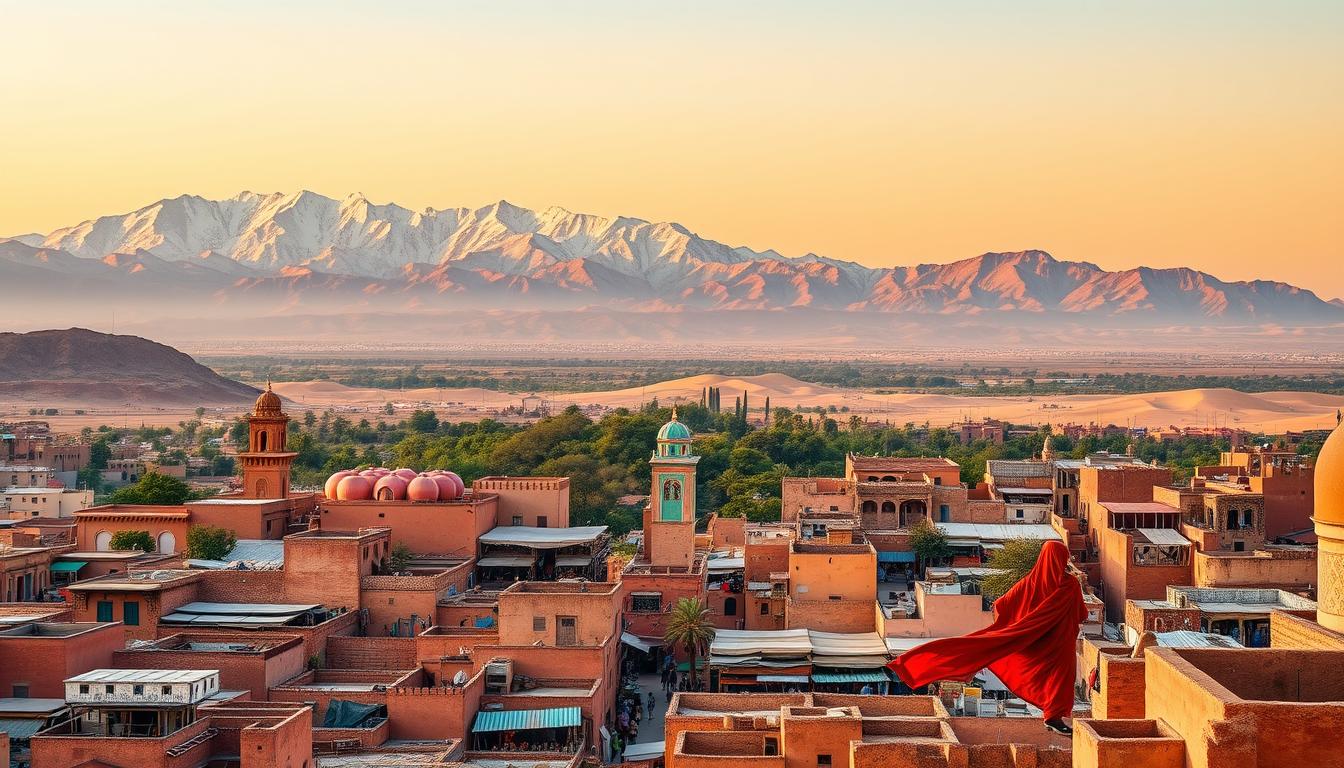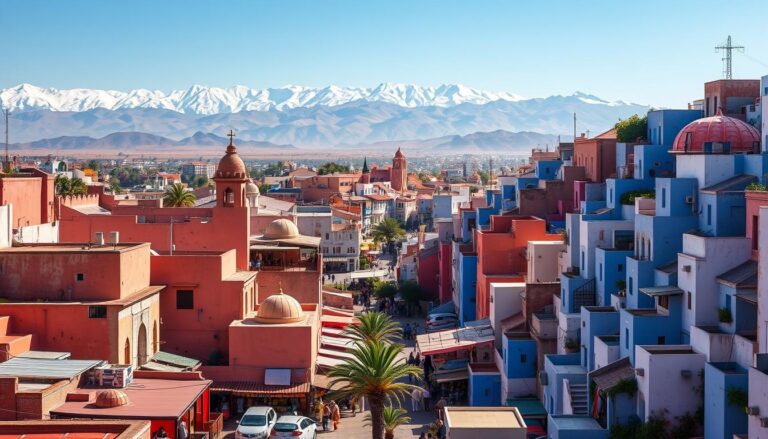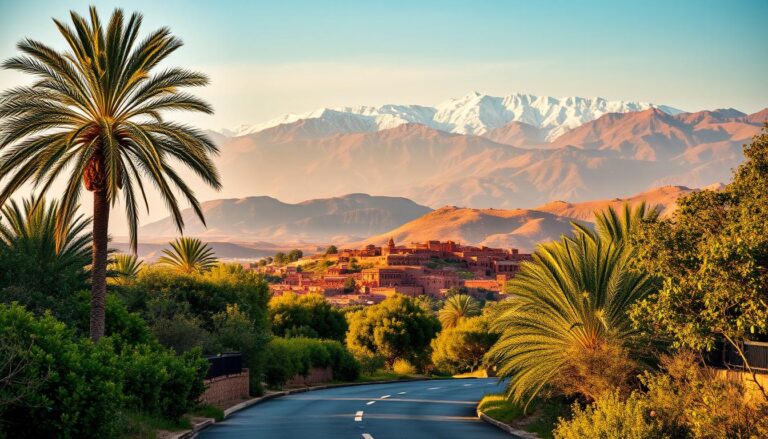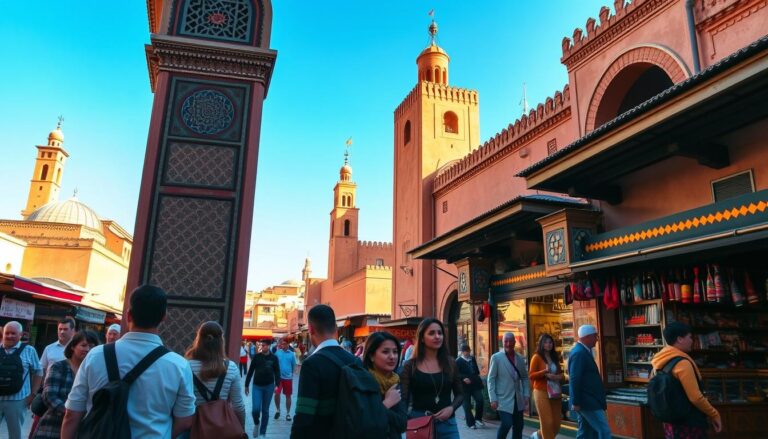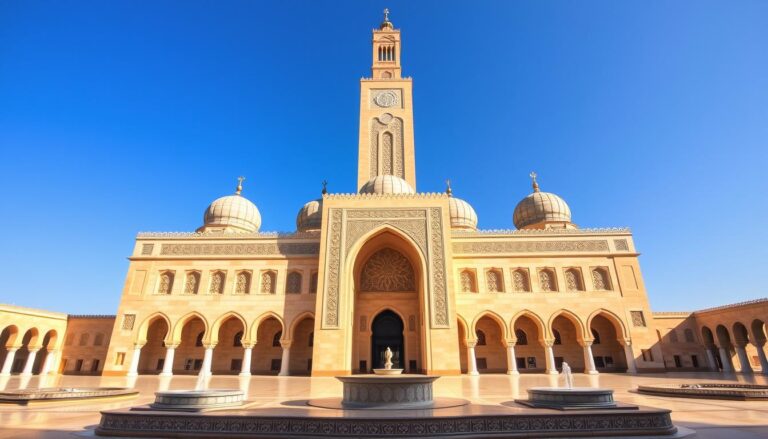10 Beautiful Places To Visit In Morocco
Table of Contents
Did you know this North African hotspot welcomes over 13 million visitors annually? Its timeless appeal lies in dramatic contrasts – snow-capped peaks tower above palm-filled oases, while ancient medinas hum beside modern art galleries.
You’ll find more UNESCO World Heritage Sites here than in Egypt or Greece. From cobalt-blue streets to golden desert dunes, every landscape feels like a living painting. The scent of saffron and sound of call-to-prayer echoes create an intoxicating rhythm.
What truly sets this destination apart? It’s where Berber, Arab, and European influences weave together seamlessly. You might sip mint tea in a 14th-century courtyard one hour, then dine at a rooftop fusion restaurant the next.
Key Takeaways
- Features 9 UNESCO sites blending nature and human history
- Offers four distinct geographical zones within one border
- Combines three cultural influences in architecture and cuisine
- Provides year-round activities from skiing to beach relaxation
- Hosts 300+ festivals celebrating local traditions annually
This guide reveals why savvy explorers keep returning to uncover new layers. Whether you crave adventure or tranquility, these locations promise memories that outshine typical vacation snapshots.
Welcome to Morocco: A Land of Wonders
Step into a realm where centuries-old craftsmanship meets vibrant street life. Four imperial cities whisper tales of dynasties past, their winding medinas preserving stories in every sunbaked brick. This crossroads of continents cradles living traditions that shape daily rhythms.
An Overview of Morocco‘s Rich History
You’ll trace empires through Rabat’s coastal fortresses and Fez’s leather tanneries. Each capital – Meknes’ monumental gates, Marrakech’s rose-hued walls – reveals shifting power centers. Kasbah strongholds stand sentinel over valleys, their earthen walls blending into rugged landscapes.
Religious scholarship thrived in ornate medersas, while Sufi saints founded spiritual hubs in remote zaouias. These layered influences create architectural wonders unmatched in neighboring countries. From Almoravid water systems to French colonial facades, history lives in every detail.
What Makes This a Must-Visit Destination
Your senses awaken to saffron-infused tagines simmering in 17th-century riads. Artisans hammer silver in souks using techniques unchanged for generations. Modern galleries reinterpret Berber geometric patterns beside contemporary cafes.
The magic lies in this seamless blend – ancient irrigation systems feed urban gardens while high-speed trains whisk you between cities. You don’t just observe culture here; you taste it in steaming mint tea, hear it in calligraphy pens scratching parchment, feel it in handwoven carpets beneath your feet.
Immersing in Morocco’s Historical Cities and Medinas
Wander through living history where century-old walls hum with modern energy. Four legendary medinas form cultural treasure chests, their labyrinthine passages hiding artisan workshops and hidden courtyards.
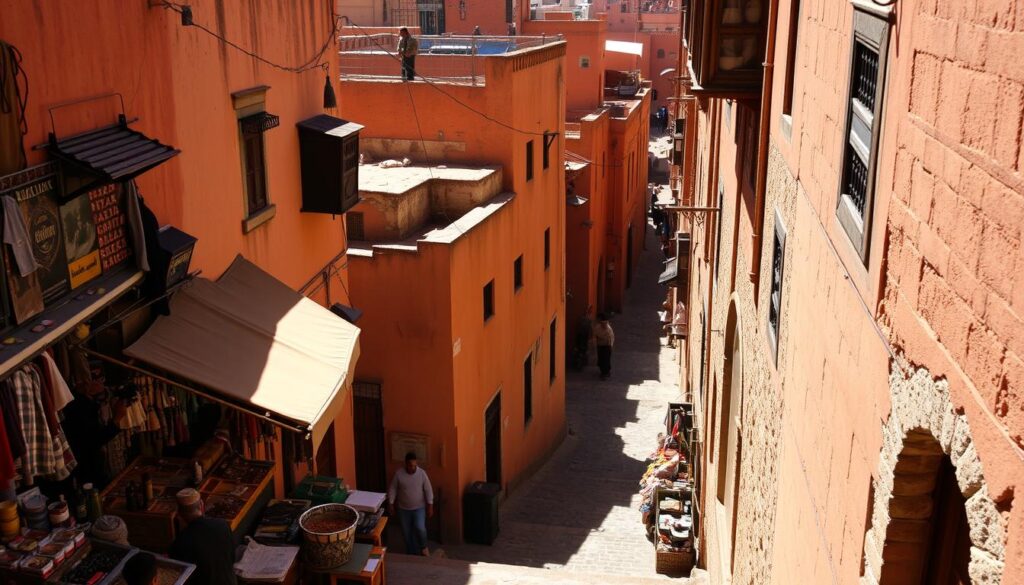
Exploring Imperial Cities and Iconic Medinas
Fez’s medina will dizzy your senses with its 9,000 alleys and ancient tanneries. Marrakech’s red-earth walls frame vibrant souks bursting with cobalt pottery and saffron pyramids. You’ll spot UNESCO plaques in Tetouan’s whitewashed lanes, where Spanish-Moorish fusion architecture tells stories of cultural exchange.
Locals still gather at communal ovens in Essaouira’s seaside medina, preserving rhythms unchanged for generations. These walled cities aren’t museums – they’re living ecosystems where craftspeople hammer copper and weave textiles using methods perfected centuries ago.
Discovering Traditional Riads and Souks
Step through unassuming doors into riads’ secret paradises. Courtyard orange trees shade zellige-tiled fountains, their geometric patterns whispering mathematical precision. Many restored mansions now offer stays where you breakfast under carved cedar ceilings.
Weekly souks transform medina squares into kaleidoscopes of color. Hone your bargaining skills for leather babouches or argan oil, guided by the scent of fresh mint tea. As sunset calls echo, vendors pack woven baskets – until dawn reignites the ancient dance of commerce.
Natural Beauty: Deserts, Mountains, and Coastal Gems
Picture yourself traversing landscapes that shift from fiery dunes to snow-capped summits within hours. The country’s natural wonders create a playground for adventurers, where otherworldly terrains reveal secrets etched by time and climate.
Sahara Desert Adventures
Feel ancient rhythms as camels carry you across rose-gold dunes stretching beyond sight. Multi-day excursions blend tradition with comfort – sleep in woven tents featuring plush bedding after feasting under starry skies. Family-friendly packages make these journeys accessible for all ages.
Base your journey in Ouarzazate, where the Ait Ben Haddou Kasbah stands as a clay fortress from the 17th century. Film buffs recognize this UNESCO site from epic movies, with nearby studios offering behind-the-scenes glimpses of blockbuster productions.
Escapades in the Atlas Mountains
Trade desert heat for crisp mountain air along trails winding through walnut groves and Berber hamlets. Local families often invite hikers for mint tea, sharing flatbread baked in earthen ovens. Spring brings wildflower explosions, while winter transforms peaks into snowy wonderlands.
Weather here keeps you guessing – pack layers for sudden temperature shifts. Guided tours adapt to all skill levels, whether you’re summiting Toubkal or exploring valley waterfalls. Each turn reveals new perspectives on this geologically dramatic region.
Cultural Experiences and Timeless Traditions
Discover the living pulse of spiritual heritage through spaces where devotion and daily life intertwine. Centuries-old institutions continue shaping community bonds, offering visitors authentic glimpses into enduring values.
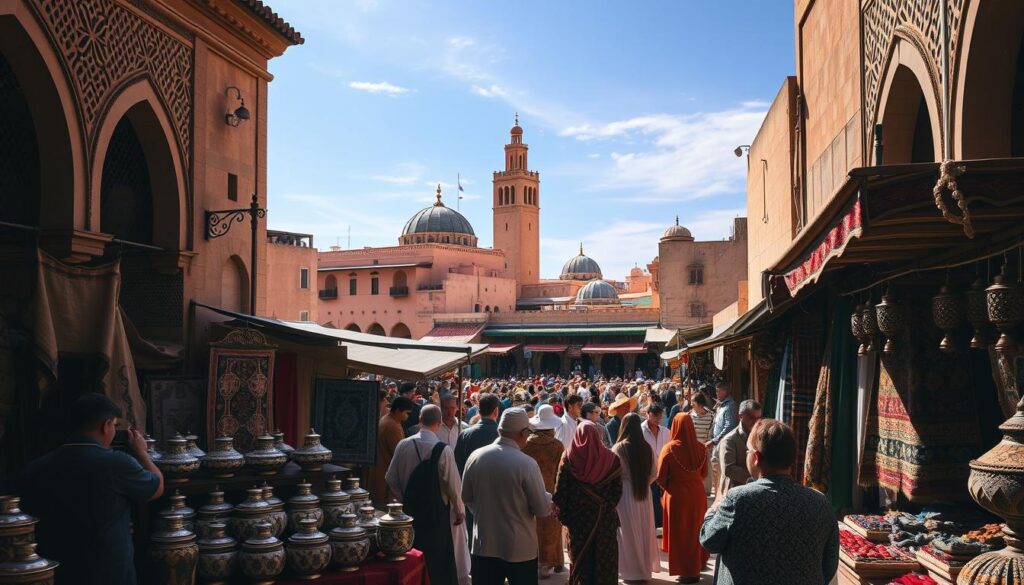
Centers of Learning and Worship
Step into medersas where geometric tilework frames courtyards once filled with scholarly debates. These Islamic colleges trained generations in philosophy and law using hand-copied manuscripts that still scent the air with aged parchment. The 14th-century Bou Inania Medersa showcases astronomy tools used by medieval students.
Friday prayers transform jamaas into humming hubs of connection. While non-Muslims can’t enter prayer halls during service times, you’ll feel the rhythm of devotion through echoing calls and flowing robes. Many include public gardens where families gather after worship.
Sacred Spaces of Mysticism
Zaouias reveal Sufism’s poetic heart through intricate woodcarvings and chanting ceremonies. At the Moulay Idriss Zaouia, pilgrims seek blessings near the founder’s tomb. These complexes often feature healing gardens with medicinal herbs mentioned in ancient texts.
Time your visit with a moussem festival for explosive displays of local pride. Watch entire villages parade handmade candles in Marrakech or cheer during Fantasia shows where riders synchronize rifle fire at full gallop. These events turn spectators into temporary community members.
Through these encounters, you become part of ongoing stories rather than just an observer. A tea shared with shrine keepers or craftsmen demonstrates how traditions adapt while keeping their soul intact.
Culinary Delights: Savoring Moroccan Flavors
Your taste buds embark on their own adventure here, where centuries-old recipes meet vibrant market energy. Every meal tells stories of spice routes and family traditions passed down through generations.
Traditional Dishes and Unique Street Food
Start your day with msemen – flaky flatbreads drizzled with local honey. Lunch calls for steaming tagines, their clay pots releasing aromas of saffron and preserved lemons. Don’t miss street-side stalls serving sizzling lamb skewers rubbed with paprika.
As sunset paints the sky, join locals slurping harira soup. This tomato-based stew pairs perfectly with chebakia – flower-shaped cookies dipped in honey. Night markets buzz with vendors crafting fresh orange juice and snail broth.
Local Dining Experiences in Riads and Markets
Family-run riads transform meals into cultural exchanges. At Baarada in Fez, chefs invite you to hand-roll couscous before feasting under starlit courtyards. Many use recipes perfected in home kitchens for decades.
| Must-Try Dish | Key Ingredients | Best Time to Enjoy |
|---|---|---|
| Chicken Tagine | Olives, preserved lemon | Lunch |
| Sfenj Doughnuts | Flour, honey, sesame | Morning |
| Harira Soup | Lentils, chickpeas, lamb | Evening |
| Grilled Kefta | Spiced ground beef | Night markets |
While exploring, stick to bottled water and busy stalls with high turnover. The rhythm of shared meals creates connections that linger long after your last bite.
Travel Smart: Navigating Morocco with Ease
Getting around efficiently transforms how you experience destinations. Smart choices in transportation let you focus on discoveries rather than logistics. Here’s how to move smoothly between bustling cities and remote wonders.
Taxis, Trains, and Bus Tips
Petite taxis zip through streets for just $1-2 per ride. Always make sure drivers activate meters to avoid tourist pricing. First-class trains connect major hubs comfortably – pack snacks for the scenic 8-hour Marrakech-Fez route.
Buses like Supratours offer affordable journeys but require in-person ticket purchases. Book return trips early during peak seasons, especially to hotspots like Chefchaouen. Grand taxis work for groups but negotiate fares before entering.
Exploring Guided Tours and Private Transfers
Day excursions to the Sahara or Atlas Mountains become stress-free with local experts. Multi-day tours often include hidden gems you’d miss independently. Though pricier, they maximize time in complex regions.
Private transfers cost more dirhams but deliver door-to-door comfort. Ideal for families or tight schedules, these let you dictate departure times. Compare options – sometimes luxury proves worth the splurge.

